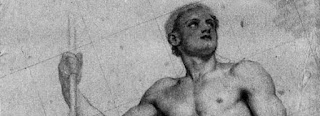THIS is the love-song we today are singing—"A Love-Song" by Florence Earle Coates. Published in The Bellman (1 December 1917).
The song of her who, blessing, most is blest:
Giver of dreams that set the soul far winging,
And bring it home to rest.
This is the song of her, our fount of being,
The pilot of our hope where'er we go:
Of her—the brave, the patient, the foreseeing—
To whom our all we owe.
The wronged, oppressed,—what poor, unfriended comer
Has not, with her, found shelter safe from storm?—
A smile of welcoming as sweet as summer,
A heart as deep and warm?
Can we have voice today for others' praises,
When evil and disaster threaten her?
Ah, no! a passion that man's soul upraises,
New-born in us, doth stir
At thought of her, belov'd, who shows us living
Is not the mere continuance of breath,
Giving her favored ones a joy of giving,
Ineffable in death!
 |
| Winged Victory in the Court of the Allies, Philadelphia |
Then, even as I grieved, I saw once more
How genius can atone and re-create:
How, by its own high gift, it can restore
The Land that gives it birth to sovereign State,
Rekindling glories that it knew before,
And deepening its life to life as great!
From "Masefield" (1922) by Florence Earle Coates.






















